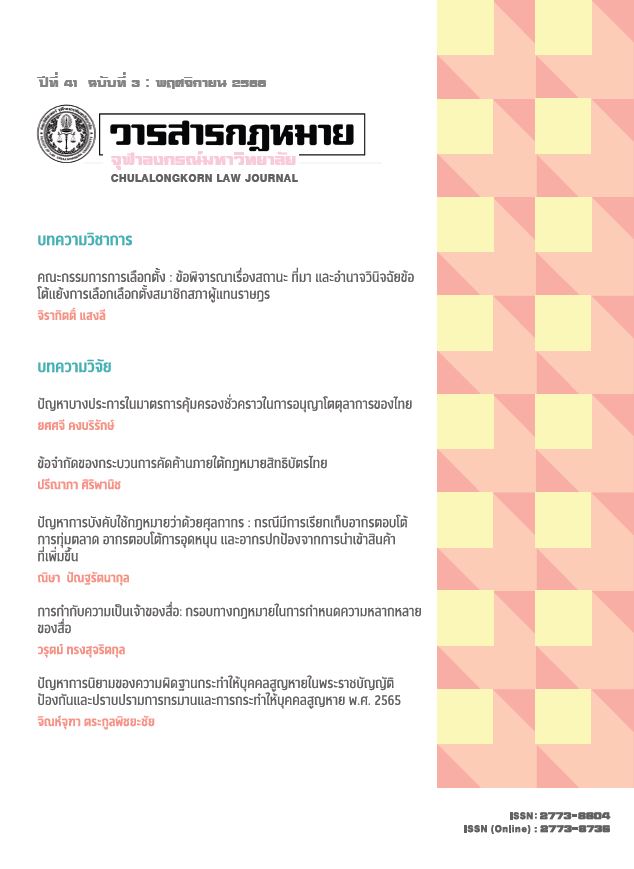ปัญหาการนิยามของความผิดฐานกระทำให้บุคคลสูญหายในพระราชบัญญัติป้องกัน และปราบปรามการทรมานและการกระทำให้บุคคลสูญหาย พ.ศ. 2565
Main Article Content
บทคัดย่อ
การกระทำให้บุคคลสูญหายเป็นอาชญากรรมร้ายแรงที่กระทบต่อสิทธิมนุษยชนและเป็นภัยคุกคามต่อมนุษยชาติที่เกิดขึ้นทั่วโลกมาเป็นระยะเวลานานแล้ว แต่เดิมอาชญากรรมนี้มักเกิดขึ้นในรูปแบบของการกักขังโดยลับ สงครามกลางเมือง และสงครามภายในที่เกิดจากการขัดกันทางอาวุธ ตามลำดับ โดยสาเหตุสำคัญที่นำมาสู่อาชญากรรมประเภทนี้คือความขัดแย้งทางความคิดไม่ว่าจะเป็นในด้านอุดมการณ์ทางการเมือง
ด้านการปกป้องหรือเรียกร้องสิทธิต่าง ๆ โดยเฉพาะการคุ้มครองสิทธิมนุษยชนหรือเป็นไปเพื่อปกปิดหลักฐานหรือความผิดอันเกิดจากการกระทำที่ไม่ชอบด้วยกฎหมายของเจ้าหน้าที่ของรัฐ มุ่งต่อกลุ่มเป้าหมาย ได้แก่ นักการเมือง ผู้นำชุมชน ผู้นำแรงงาน นักปกป้องสิทธิมนุษยชน ฯลฯ ซึ่งในทางระหว่างประเทศให้ความสำคัญในการมุ่งแก้ไขและขจัดปัญหาดังกล่าวโดยสร้างเครื่องมือทางกฎหมายขึ้นหลายฉบับ โดยประเทศไทยได้เล็งเห็นความสำคัญของปัญหาดังกล่าวและมีความพยายามในการสนองรับนโยบายในการมีมาตรการป้องกันและคุ้มครองไม่ให้บุคคลสูญหายขึ้นใช้บังคับภายในประเทศโดยการรับหลักการและแนวทางจากเครื่องมือทางกฎหมายระหว่างประเทศมาบัญญัติเป็นพระราชบัญญัติป้องกันและปราบปรามการทรมานและการกระทำให้บุคคลสูญหาย พ.ศ. 2565 ซึ่งมีผลใช้บังคับแล้วในวันที่ 22 กุมภาพันธ์ 2566 นิยามของการกระทำให้บุคคลสูญหายในกฎหมายฉบับดังกล่าวบัญญัติโดยใช้ถ้อยคำตามอนุสัญญาระหว่างประเทศซึ่งบัญญัติกว้างเกินไปและมีอย่างน้อยหกประเด็นที่อาจยังกำหนดไม่ชัดเจนเพียงพอแลครอบคลุมต่อบริบทของการกระทำความผิด เมื่อศึกษาเปรียบเทียบกฎหมาระหว่างประเทศที่เกี่ยวข้องและกฎหมายของต่างประเทศเพิ่มเติมแล้วจึงเห็นว่าควรบัญญัติแก้ไขเพิ่มเติมนิยามของการกระทำดังกล่าวให้ครอบคลุมและชัดเจนมากขึ้น
Article Details

อนุญาตภายใต้เงื่อนไข Creative Commons Attribution-NonCommercial-NoDerivatives 4.0 International License.
ลิขสิทธิ์และเนื้อหาในเว็บไซต์ของวารสารกฎหมาย (รวมถึง โดยไม่จำกัดเฉพาะ เนื้อหา รหัสคอมพิวเตอร์ งานศิลป์ ภาพถ่าย รูปภาพ ดนตรีกรรม โสตทัศนวัสดุ) เป็นกรรมสิทธิ์ของวารสารกฎหมาย และผู้ได้รับการโอนสิทธิทุกราย
1. วารสารกฎหมาย ให้อนุญาตให้คุณใช้สิทธิอันไม่เฉพาะเจาะจงที่สามารถถูกถอนเมื่อใดก็ได้ โดยไม่มีค่าใช้จ่าย ในการ
- เยี่ยมชมเว็บไซต์และเอกสารในเว็บไซต์นี้ จากคอมพิวเตอร์หรือเครื่องมือสื่อสารผ่านเว็บบราวเซอร์
- คัดลอกและจัดเก็บเว็บไซต์และเอกสารในเว็บไซต์นี้บนลงคอมพิวเตอร์ของคุณผ่านระบบความจำ cache
- สั่งพิมพ์เอกสารจากเว็บไซต์นี้สำหรับการใช้ส่วนตัวของคุณ
- ผลงานที่ได้รับการตีพิมพ์โดยวารสารกฎหมาย จุฬาลงกรณ์มหาวิทยาลัย ถูกคุ้มครองภายใต้ Creative Commons Attribution 4.0 International License ซึ่งอนุญาตให้ทุกคนสามารถคัดลอก แจกจ่าย ดัดแปลง ส่งต่อ ผลงานได้ ก็ต่อเมื่อผลงานและแหล่งข้อมูลได้รับการอ้างอิงอย่างเหมาะสม
2. วารสารกฎหมาย จุฬาลงกรณ์มหาวิทยาลัย สงวนสิทธิ์ไม่อนุญาตให้คุณใช้สิทธิอื่นใดที่เกี่ยวข้องกับเว็บไซต์และเอกสารบนเว็บไซต์นี้ เช่น การคัดลอก ดัดแปลง เปลี่ยนแปลง ส่งต่อ ตีพิมพ์ แจกจ่าย เผยแพร่ จัดแสดงในที่สาธารณะ ไม่ว่าจะในรูปแบบใดก็ตาม ซึ่งเว็บไซต์หรือเอกสารบนเว็บไซต์ โดยไม่อ้างอิงถึงแหล่งข้อมูลหรือโดยไม่ได้รับอนุญาตเป็นลายลักษณ์อักษรจากวารสารกฎหมาย จุฬาลงกรณ์มหาวิทยาลัย
3. คุณอาจขออนุญาตที่จะใช้เอกสารอันมีลิขสิทธิ์บนเว็บไซต์นี้โดยการเขียนอีเมลล์มายัง journal@law.chula.ac.th
4. วารสารกฎหมาย จุฬาลงกรณ์มหาวิทยาลัย เข้มงวดกับการคุ้มครองลิขสิทธิ์อย่างมาก หากวารสารกฎหมาย จุฬาลงกรณ์มหาวิทยาลัยพบว่าคุณได้ใช้เอกสารอันมีลิขสิทธิ์บนเว็บไซต์นี้โดยไม่ถูกต้องตามการอนุญาตให้ใช้สิทธิ ดังที่กล่าวไปข้างต้น วารสารกฎหมาย จุฬาลงกรณ์มหาวิทยาลัยอาจดำเนินคดีตามกฎหมายต่อคุณได้ เพื่อเรียกร้องค่าเสียหายที่เป็นตัวเงินและคำขอชั่วคราวให้คุณหยุดการใช้เอกสารดังกล่าว ทั้งนี้ คุณอาจถูกสั่งให้ชดใช้ค่าใช้จ่ายใดๆ ที่เกี่ยวข้องกับการดำเนินการตามกฎหมายนี้
หากคุณพบเห็นการใช้เอกสารอันมีลิขสิทธิ์ของวารสารกฎหมาย จุฬาลงกรณ์มหาวิทยาลัย ที่ขัดหรืออาจขัดต่อการอนุญาตให้ใช้สิทธิดังที่ได้กล่าวไปข้างต้น โดยเชื่อว่าได้ละเมิดลิขสิทธิ์ของคุณหรือของผู้อื่น สามารถร้องเรียนมาได้ที่ journal@law.chula.ac.th
เอกสารอ้างอิง
Amnesty International., Amnesty International report 1992 (London, United Kingdom)
Art.3(a) of Anti-Enforced or Involuntary Disappearance Act of 2012
Art.3(b) of Anti-Enforced or Involuntary Disappearance Act of 2012
Article 1 of The UN Declaration for the Protection of All Persons from Enforced Disappearance
Article 165 of Colombia Penal Code
ARTICLE 201 TER of CODIGO PENAL DE GUATEMALA
Article 210 of The National Penal (Code) Act, 2074 (2017)
ARTICLE 212-1 to ARTICLE 212-3 of FranceCode pénal
Article 4 of The UN Declaration for the Protection of All Persons from Enforced Disappearance
Citroni & Scovazzi, UNWGEID, Annual Report for 1995, E/CN.4/1996/38, (1996), p.271
Colombian Government, “Ley 599 de 2000” [ออนไลน์] แหล่งที่มา : https://www.funcionpublica.gov.co/eva/gestornormativo/norma.php?i=6388 [10 พฤษภาคม 2566]
Committee on Legal Affairs and Human Rights,"Enforced disappearance" [ออนไลน์] แหล่งที่มา: https://pace.coe.int/en/files/11021 [28 เมษายน 2565]
General Assembly, "HUMAN RIGHTS COUNCIL' IMPLEMENTATION OF GENERAL ASSEMBLY RESOLUTION 60/251 OF 15 MARCH 2006 ENTITLED” [ออนไลน์] แหล่งที่มา: https://www2.ohchr.org/english/bodies/hrcouncil/docs/a.res.60.251_en.pdf [30 มิถุนายน 2565]
General Assembly, "IMPLEMENTATION OF GENERAL ASSEMBLY RESOLUTION 60/251 OF 15 MARCH 2006 ENTITLED “HUMAN RIGHTS COUNCIL” [ออนไลน์] แหล่งที่มา : https://digitallibrary.un.org/record/595102?ln=en [20 มกราคม 2564]
Human Right Watch, "Nepal: Joint Memorandum on the Disappearances of Persons (Crime and Punishment) Bill" [ออนไลน์] แหล่งที่มา : Nepal: Joint Memorandum on the Disappearances of Persons (Crime and Punishment) Bill (amnesty.org) [14 พฤษภาคม 2566]
International commission of Jurists, "BRIEFING PAPER : DISAPPEARANCES IN NEPAL: ADDRESSING THE PAST, SECURING THE FUTURE," [online] Available from : https://www.icj.org/wp-content/uploads/2012/04/Nepal-Briefing-paper-on-Enforced-Disappearances-Analysis-briefs-2009.pdf. [10 May 2023]
International Commission Of Jurists, "Serious Crimes in Nepal’s Criminal Code Bill, 2014 (2017)" [ออนไลน์] แหล่งที่มา: www.icj.org/wp-content/uploads/2017/03/Nepal-Serious-Crimes-Bill-Advocacy-Analysis-Brief-2017-ENG.pdf [10พฤษภาคม 2566]
Nepal Government, “The National Penal (Code) Act, 2074 (2017)” [ออนไลน์] แหล่งที่มา : https://www.moljpa.gov.np/en/wp-content/uploads/2018/12/Penal-Code-English-Revised-1.pdf [8 พฤษภาคม 2565]
Philip Linghammar, "Time for Enforced Disappearance to Disappear. A Study of the International Legal Instruments Addressing Enforced Disappearance." (2009)
Rodley Nigel S. และ Matt Pollard, "The treatment of prisoners under international law" (Oxford: Oxford University Press, 2009)
The Lawphil Project, “REPUBLIC ACT NO. 10353 (AN ACT DEFINING AND PENALIZING ENFORCED OR INVOLUNTARY DISAPPEARANCE)” [ออนไลน์] แหล่งที่มา : Republic Act No. 10353 (lawphil.net) [26 เมษายน 2566]
The Nepal Constituent Assembly, "A Bill Relating to Providing for the Disappearances (2008)” [ออนไลน์] แหล่งที่มา : Microsoft Word - Disappearance Bill 2066 Eng cabinet Approved November.doc (wordpress.com) [14 พฤษภาคม 2566]
The Parliamentary Assembly of the Council of Europe, PACE, “Resolution 1868 (2012) Final version” [ออนไลน์] แหล่งที่มา : https://assembly.coe.int/nw/xml/XRef/Xref-XML2HTML-en.asp?fileid=18076&lang=EN [24 เมษายน 2565]
The Universal Declaration of Human Rights 1948 (UDHR) [online] Available from : https://www.un.org/en/about-us/universal-declaration-of-human-rights [22 May 2023]
United Nation Treaty Collection, “10. Rome Statute of the International Criminal Court Rome, 17 July 1998” [ออนไลน์] แหล่งที่มา : https://treaties.un.org/pages/ViewDetails.aspx?src=IND&mtdsg_no=XVIII10&chapter=18&clang=_en [10 กรกฎาคม 2566]
United Nations Economic and Social Council, “Civil and Political Rights, Including Questions of: Disappearances and Summary Executions” [ออนไลน์] แหล่งที่มา: https://digitallibrary.un.org/record/459055?ln=en [8 มิถุนายน 2564].
United Nations Economic and Social Council, “Civil and Political Rights, Including Questions of : Disappearances and Summary Executions”, UN DOC E/CN.4/2002/71, (2002)
United Nations General Assembly, “Report of the Working Group on Enforced or Involuntary Disappearances” [ออนไลน์] แหล่งที่มา : https://ap.ohchr.org/documents/dpage_e.aspx?si=A/HRC/16/48 [10 พฤษภาคม 2566]
United Nations, “CIVIL AND POLITICAL RIGHTS, INCLUDING QUESTIONS OF: DISAPPEARANCES AND SUMMARY EXECUTIONS” [online] Available from : https://undocs.org/Home/Mobile?FinalSymbol=E%2FCN.4%2F2002%2F71&Language=E&DeviceType=Desktop&LangRequested=False [10 May 2023]
United Nations, “Report of the Intersessional Open-ended Working Group to elaborate a draft legally binding normative instrument for the protection of all persons from enforced disappearance” [online] Available from : https://ap.ohchr.org/documents/dpage_e.aspx?si=E/CN.4/2005/66 [10 May 2023]
United Nations, “Report of the Intersessional Open-ended Working Group to elaborate a draft legally binding normative instrument for the protection of all persons from enforced disappearance Chairperson-Rapporteur: Mr. Bernard Kessedjian (France)” [ออนไลน์] แหล่งที่มา: https://undocs.org/Home/Mobile?FinalSymbol=E%2FCN.4%2F2005%2F66&Language=E&DeviceType=Desktop&LangRequested=False [24 เมษายน 2565]
United Nations, “Report of the Intersessional Open-Ended Working Group to Elaborate a Draft Legally Binding Normative Instrument for the Protection of All Persons from Enforced Disappearance” [online] Available from : https://undocs.org/Home/Mobile?FinalSymbol=E%2FCN.4%2F2004%2F59&Language=E&DeviceType=Desktop&LangRequested=False [10 May 2023]
United Nations, “Report of the Working Group on Enforced or Involuntary Disappearances” [online] Available from : https://undocs.org/Home/Mobile?FinalSymbol=A%2FHRC%2F16%2F48%2FAdd.3&Language=E&DeviceType=Desktop&LangRequested=False [10 พฤษภาคม 2566]
Working Group on Enforced or Involuntary Disappearances, "General Comment on the definition of enforced disappearance” [online] Available from : https://www.ohchr.org/Documents/Issues/Disappearances/GeneralCommentsDisappearances_en.pdf. [10 May 2023]
Working Group on Enforced or Involuntary Disappearances, “General Comment on the definition of enforced disappearance” [ออนไลน์] แหล่งที่มา : https://www.ohchr.org/Documents/Issues/Disappearances/GeneralCommentsDisappearances_en.pdf [20 มกราคม 2564]
กระทรวงการต่างประเทศ, “พัฒนาการของไทยต่อการป้องกันและปราบปรามการทรมานและการกระทำให้บุคคลสาบสูญ” [ออนไลน์] แหล่งที่มา : https://www.mfa.go.th/th/content/5d5bd0c715e39c3060021430?cate=5d5bcb4e15e39c306000683d [10 พฤษภาคม 2566]
ปณิธัศร์ ปทุมวัฒน์, “หลักสากล : มิติทางกฎหมายภายใต้โลกาภิวัฒน์ (Universal Principles : Legal Aspect and Globalization)” [ออนไลน์] แหล่งที่มา : https://www.senate.go.th/assets/portals/93/fileups/272/files/S%E0%B9%88ub_Jun/13win/win74.pdf. [22 พฤษภาคม 2566]
ประมวลกฎหมายอาญา มาตรา 95
เมธาวี คงพิกุล. กฎหมายและมาตรการทางอาญาในกรณีเจ้าหน้าที่รัฐบังคับให้บุคคลสูญหาย. วิทยานิพนธ์ปริญญามหาบัณฑิต คณะนิติศาสตร์ จุฬาลงกรณ์มหาวิทยาลัย, 2556
วงพลอย นวลอ่อน. การกำหนดความรับผิดทางอาญาฐานกระทำให้บุคคลสูญหาย. วิทยานิพนธ์ปริญญามหาบัณฑิต คณะนิติศาสตร์ มหาวิทยาลัยธรรมศาสตร์, 2556
สำนักงานข้าหลวงใหญ่เพื่อสิทธิมนุษยชนแห่งสหประชาชาติ (The Office of the High Commissioner for Human Rights: OHCHR), “International Convention for the Protection of All Persons from Enforced Disappearance” [online] Available from : https://www.ohchr.org/en/instruments-mechanisms/instruments/international-convention-protection-all-persons-enforced [10 May 2023]
อัจฉรา ฉายากุล, การอนุวัติกฎหมายไทย ตามอนุสัญญาต่อต้านการทรมานและการประติบัติหรือการลงโทษอื่นที่โหดร้ายไร้มนุษยธรรมหรือย่ำยีศักดิ์ศรีและเพื่อเตรียมรองรับการเข้าเป็นภาคีพิธีสารเลือกรับของอนุสัญญาต่อต้านการทรมานฯ รวมทั้งอนุสัญญาระหว่างประเทศว่าด้วยการคุ้มครองมิให้บุคคลถูกบังคับให้สูญหาย (สำนักงานคณะกรรมการสิทธิมนุษยชนแห่งชาติ, 2558)


